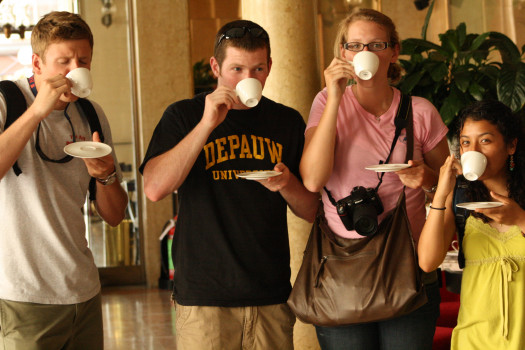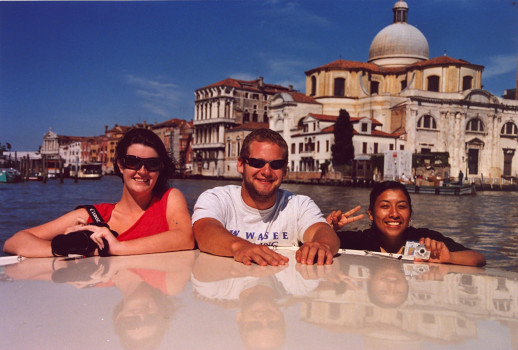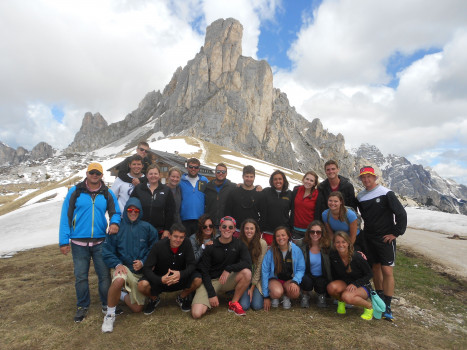The Case for Immersion Abroad



by Francesca Seaman, Associate Professor of Modern Languages
Why should DePauw send students abroad?
I have worked with students abroad since 1991, and while we can talk about forming global citizens, it is only when we experience life in an unfamiliar context that we rethink the assumptions we had conceived of the world and of ourselves. If we say that our program is transformative, it is because we provide students with the opportunity to share their identity, challenge it, and rethink it. Only an authentic immersion in a new culture offers insights into cultures that are drastically different from one’s own. It is when living in a full immersion program abroad that students learn to navigate through a different culture, and appreciate new ways of thinking while reconsidering critically one’s own perspectives.
During our eight-week program, we place students in carefully selected families, whom we know personally, and whom we personally prepare for this experience with a sequence of pre-arrival workshops. While the environment that these families provide is safe, it is also unfamiliar and beyond the students’ comfort zone, offering a complete and continuous immersion, as a well as an authentic opportunity for intercultural engagement from morning to night.
What is intercultural education?
If I were I to define intercultural education through the elements of change that I notice in my students, I would say that, as they witness a different kind of universe around them, they experience a sort of disenchantment with the world – and its apparent universality - as they knew it.
Our eight-week program is articulated in a series of intensive lessons in Italian language and culture, taking place in the mornings and afternoons. Lessons are enriched with guest speakers, daily cultural events, free tutoring sessions, conversation hours at cafés and on the beach. We organize numerous excursions both to celebrated cities and to places off the beaten path, giving pre-departure PowerPoint presentations and on-site lectures on history and art. We also encourage the students to travel independently on the weekends.
Once they are in Italy, does their education come together almost by chance?
Everything that happens during the eight weeks is intentionally planned for the students in order to provide meaningful interactions with a new culture. For example, students meet with the local mayor, play basketball and soccer with local kids, attend local festivities, such as concerts and parties on the beach, and soon become integrated into the community. (After the program ended, many people from Grado told me how much they missed the DePauw students from their daily lives).
How do we guide our students through an international and intercultural experience?
First of all, we believe that a wider cultural horizon is easier to gain with a positive attitude, so we encourage the students to maintain an openness to cultural differences. A key component of our program is to stimulate students’ language skills through interaction with the local community. We help the students to experience everyday life in the host culture, create opportunities for their meaningful interactions with local people, ask them to reflect on and analyze unfamiliar situations, and teach them to be willing to reserve judgement and to listen across cultures.
What determines the success of your students?
At the end of the program, we see that students have a new ideology of openness toward the unfamiliar, which they now seem to face with a vivid intellectual curiosity. These students now move with ease between different worlds, and they have grown to become responsible global citizens. They have gained substantial knowledge of Italian language and culture, they have discovered a new capacity for personal growth, they have developed the ability to form interpersonal and intercultural relationships, and they have refined their ability to be cultural mediators.
In an immersive experience of this kind, the encounter with the unfamiliar instigates a transformative process. The students travel through a place and a time for feelings of inadequacy, vulnerability and weakness toward a newly discovered potential of their own, a better sense of how to manage risks, sharpened problem-solving skills, a more imaginative and ambitious sense of their own future, a new understandings of different value systems, questioning their own ethical responsibility and creating their own forms of cross-cultural understanding, with a new awareness and sensitivity for a diverse world. We believe that these are essential characteristics now essential in the leaders of the future.
What is your vision for the future of this program?
We strive to maintain a program that will always be at least cost neutral for the university, but we hope that the DePauw Summer Immersion Program in Italy will one day have its own campus, hosting interdisciplinary programs, offering positions of leadership to students, engaging alumni, and becoming a signature program showcasing one of the many ways in which DePauw is invested in changing students’ lives (to quote President McCoy). We offer a program that exposes our students to new cultures and gives them new insights, with the ultimate goal of building a better life for our community and beyond. Studying abroad is the cornerstone in the education of the global leader of the future. We believe that we have created a strong international academic program in an ideal location where we take great care to offer DePauw students the opportunities to gain new knowledge and to integrate it in a practical way. The crucial goal of our work is to show our students that diversity in the world is not inconsequential. In the words of one of my students: “The life perspective I gained from immersion in another culture is ultimately invaluable.”